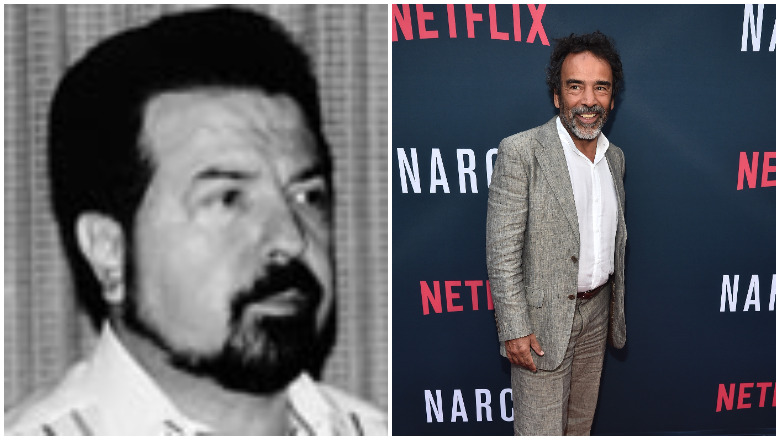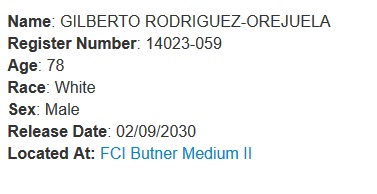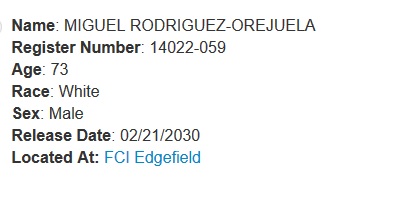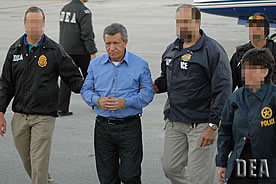
Wikimedia Commons/Getty The real Gilberto Rodriguez Orejuela (l) and actor Damian Alcazar of Narcos 3.
Gilberto Rodriguez Orejuela was featured in Narcos Season 3 as one of the four Cali Cartel “godfathers,” who control the Colombian political system and the drug trade after the fall of Pablo Escobar.
Warning: There are plot spoilers ahead.
Was Gilberto Rodriguez a real person? Yes, as with the other three godfathers and various characters in season 3, his story is based on reality, although Netflix did take some liberties with the details. What’s the story of the real Gilberto Rodriguez Orejuela? Is he still alive? Where is he now? (He is played by actor Damian Alcazar on the show).
The real Gilberto is currently incarcerated in a federal prison in the United States. His release date is not until 2030. He’s serving his time at a prison called Butner in North Carolina, according to the Bureau of Prisons database.

Gilberto’s brother, Miguel, is also behind bars in the U.S.
According to federal prison records, Miguel Rodriguez-Orejuela, currently 73, is serving his time in a South Carolina prison called Edgefield.

According to the Bureau of Prisons, Edgefield is “a medium security federal correctional institution with an adjacent minimum security satellite camp.”
Just how powerful were the brothers in real life? Very.
Pablo Escobar was a renegade, but the Cali Cartel and the Rodriguez brothers wielded power through bribing political insiders, just like Netflix depicts. Showrunner Eric Newman “has called Narcos a 50-50 dramatization in hopes that viewers watch the series interactively and take to Googling the events that are depicted, but he has confirmed that the chronology is accurate,” reports The Hollywood Reporter.
In real life, both brothers were brought to Miami, where they received prison terms that, at their ages, will mean they will die behind bars.
“Gilberto and Miguel Rodriguez Orejuela, ages 67 and 63, each received 30 years in prison, after they pleaded guilty in a federal court in Miami to conspiring to import 200,000kg of cocaine into the US,” reported UK Metro in 2006. “They sacrificed themselves for their family,” said David O. Markus, attorney for Gilberto Rodriguez Orejuela, according to the news site. The brothers entered plea agreements agreeing to give up massive amounts of wealth in return for non-prosecution of some family members.

Miguel Rodriguez-Orejuela.
The brothers were at the height of their power in the 1980s and 1990s and earned billions of dollars.
“The Cali cocaine barons weren’t interested in assassinating politicians who got in their way – instead they won them over and bribed their way into helpful alliances,” reports The Sun. According to Insight Crime, “During the height of their operations in the 1980s and 1990s, the Cali Cartel trafficked hundreds of tons of cocaine to the United States and Europe and amassed a fortune worth an estimated $12 billion.”
According to CBS News, Cali “controlled about 80 percent of the world cocaine market after drug lord Pablo Escobar was killed in 1993. Their Cali-based empire moved multi-ton shipments of cocaine to the United States and across the globe.”
The real-life cartel was spearheaded by Miguel, his brother, Gilberto, José “Chepe” Santacruz-Londoño, and Hélmer “Pacho” Herrera.
At first, it looked like Gilberto might get away with it all, but he eventually faced the one net that even a Colombian drug lord can’t buy his way out of: Extradition.
In 2002, The Los Angeles Times reported that Gilberto had walked out of prison. The Associated Press story reported that the “former drug kingpin was freed…after serving only half his sentence, despite a U.S. effort to find evidence to support further charges — and possibly his extradition to the United States.” He was arrested in 1995 and sentenced to serve a prison term until 2010. After his 2002 release, he was recaptured in 2003. However, eventually the U.S. government managed to extradite him, and he’s been in prison ever since.
In 2014, the U.S. government removed “economic sanctions against over 300 people and entities linked to the organization,” reports InsightCrime, but left Gilberto and Miguel on the list.
